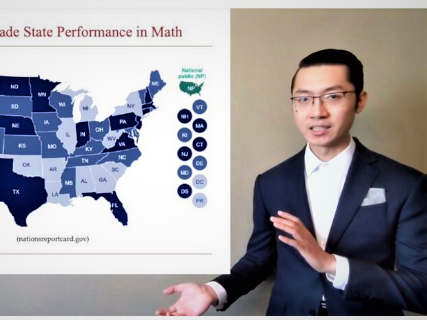Tran Takes First Place in Inaugural ‘Big Pitch’ Competition

Great ideas shouldn’t take long to explain, right? That’s the argument behind the university’s The Big Pitch competition, which says it knows the right amount of time.
Just three minutes.
Modeled on the Three Minute Thesis or 3MT competitions that started at Australia’s University of Queensland in 2008 and have become popular at higher education institutions around the globe, CGU’s The Big Pitch challenges student competitors to make a persuasive 3-minute presentation about their research projects to a panel of judges for cash prizes.
Can You Sum Up Your Research to Just Three Minutes?
The university’s inaugural competition—which was held online in December—featured six finalists competing for cash prizes of $1,000 (first place), $500 (second place), and $250 (third place), with the remaining finalists receiving $150 for their participation.
Organizer Marcus Weakley, who serves as director of the university’s Center for Writing and Rhetoric, said he was thrilled with community response despite the challenges posed by quarantine.
“I couldn’t be happier with the response to the event,” he said. “Numerous students dedicated themselves to the competition and, from everything I’ve heard, learned a lot from it. The judges did a great job and ensured that the quality was up to CGU’s standards. Overall, I think this year built a strong foundation on which I hope the event continues to grow in the years ahead.”
Loading...
This Year’s Winners & Finalists
Vinh Tran made the winning presentation, a School of Educational Studies doctoral candidate, whose prize-winning presentation was “Shortest Way Home: Developing An Interstate Policy Exchange Framework for K-12 Math and Science Education.”
Math and science performances are wildly uneven from state to state, which is why Tran believes bringing together high-performing states (like Texas) with low-performing ones (like California) in small clusters would help to identify key factors and policies for student success that struggling states can then use for their students.
In each cluster, explained Tran (whose academic focus is education policy), states can align themselves with those that are “similar to each other and potentially adopt policies from those doing much better in math and science. … It will make it easier [for states] to define what policies might work.”
In addition to Tran, other participants were: Amber Kea-Edwards, whose “Development or Discrimination?: An Intersectional Lens on Multi-Source Feedback” took second place and the audience’s favorite award (Division of Behavioral & Organizational Studies–DBOS); and Katrina Denman, whose “Angels ‘Leaning In’: Uncovering Women’s Roles in Academic History” took third (School of Arts & Humanities–SAH).
The Big Pitch teaches translatable skills that are valuable for all students, says organizer Marcus Weakley.
Also participating were Amanda Castillo, “Strengthening Teacher Evaluation Systems in K-12 Public Education” (School of Educational Studies), Kerri Dean, “(re)Imagining the Evergreen” (SAH), and Tamar Salibian, “Reading Reality TV: Publicizing, Promoting, and Commodifying the Self” (SAH).
As Weakley looks ahead to the next Big Pitch competition in November, he said he hopes to work more directly with each school and department to integrate the ideas behind The Big Pitch format into the university’s intellectual life and inspire more students.
I hope that more students learn to put their graduate projects into concise, jargon-free presentations for general audiences. This is a valuable and translatable skill for the 21st-century graduate student and will only improve the final event each year.
- Interested in competing? Learn more and watch all of the contestants’ 3-minute presentations here.